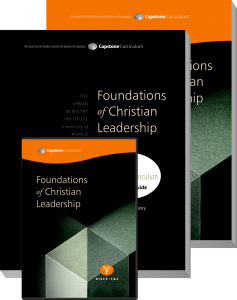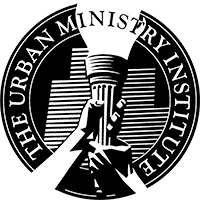 Module 7: Foundations for Christian Leadership
Module 7: Foundations for Christian Leadership
The leaders of the Church of God are his precious gifts to his people throughout the ages. The evidence that Jesus loves his people dearly is that he has granted unto them apostles, prophets, evangelists, pastors and teachers to equip his people to represent the Kingdom of God in this fallen and soon-to end world (Eph. 4.9-16). This module highlights the various roles and offices associated with this high and important task in the Kingdom of God.
This course explores the roles and offices of four of the critical positions of leadership in the Church. The Christian Leader as Deacon probes the foundations of Christian leadership as it relates to the offices and functions of the diaconate, or ministry of deacons, as a servant, a steward, and an assistant. The Christian Leader as Elder traces the notion from its OT root in the tribal system synagogue, the Sanhedrin, and to the NT Church. The Christian Leader as Pastor outlines the biblical context of the idea of the pastorate, tracing historically the development of the idea of undershepherd of the flock. Finally, the Christian Leader as Bishop defines the dynamic concept of bishop as overseer, tracing its probable context from the council of elders in Jewish rulership to its development in the history of the Church.
Course Details
Lesson 1: The Christian Leader as Deacon
Lesson 2: The Christan Leader as Elder
Lesson 3: The Christian Leader as Pastor
Lesson 4: The Christian Leader as Bishop
Module Description
Foundations for Christian Leadership
The leaders of the Church of God are his precious gift to his people throughout the ages. The evidence that Jesus loves his people dearly is that he has granted unto them apostles, prophets, evangelists, pastors and teachers to equip his people to represent the Kingdom of God in this fallen and soon-to end world (Eph. 4.9-16). This module highlights the various roles and offices associated with this high and important task in the Kingdom of God.
To begin with, in Lesson 1, The Christian Leader as Deacon (Diakonoi) we will probe the foundations of Christian leadership as it relates to the offices and functions of leadership in the local church. We will explore the ministry of deacons, or, in the Greek, diakonoi, examining its meaning in the Greek NT, and its probable origins in the Jewish synagogue. We will also look at the diaconate, or ministry of deacons, and comment on the authority and functions of this ministry through three models of the Deacon’s role: as a servant, as a steward, and as an assistant.
Next, in our second lesson, The Christian Leader as Elder (Presbyteroi) we will trace the notion of elder from its OT root in the tribal system and synagogue, to the Sanhedrin, and to the NT Church. We’ll then give careful consideration to the calling of and the criteria for becoming an elder in the NT Church, and will complete our brief study by examining several analogies to help us understand the nature of biblical eldership; that of an overseer, a father or parent, a colleague or team member, and finally a representative. We will consider these in order to discover new ways we can put the principles of eldership into practice in our own lives and ministries.
In Lesson 3, The Christian Leader as Pastor (Poimenes), we will outline the biblical context of the idea of the pastorate, starting with the definition of the Greek term for pastoring, and tracing historically the development of the idea of a formal office of the pastorate. We will then highlight the calling and the criteria for representing God as an undershepherd of the flock. We will close our section with a discussion of pastoral authority, along with a look at three biblical models and analogies of pastoral care: that of a nurturer and care giver, a protector and guardian, and a leader of the flock of God.
Finally, in Lesson 4, The Christian Leader as Bishop (Episkopoi), we will provide a broad definition and overview to this dynamic concept of bishop or overseer. Beginning with a consideration of the NT language, we will trace its probable context from the council of elders in Jewish rulership, including the development of the concept, through the history of the Church. After considering the calling and criteria of the bishop’s office, we will examine the concept of bishop through the images of supervisor, apostle, and spiritual director. We hope our study will show how the very nature of Christian leadership and Christian community demands bishop-level oversight and relationship which goes beyond just the local body itself.
It is hard to imagine a more wonderful gift to an assembly or group of assemblies than godly, Christlike leadership, true shepherds who guard and protect the flock of God. May God use this study to inspire you to nurture and care for his people, to emulate the Good Shepherd who laid down his life for his sheep.
Reading Assignments
Lesson 1: Reading Assignments
By the conclusion of this lesson, you should have read the following:
Allsman, The Heroic Venture, pp. 19-74.
Bennett, Metaphors of Ministry: Biblical Images for Leaders and Followers, pp. 11-71.
Getz, Elders and Leaders, pp. 90-117.
Lesson 2: Reading Assignments
By the conclusion of this lesson, you should have read the following:
Allsman, The Heroic Venture, pp. 75-139.
Bennett, Metaphors of Ministry: Biblical Images for Leaders and Followers, pp. 72-139.
Getz, Elders and Leaders, pp. 111-235.
Lesson 3: Reading Assignments
By the conclusion of this lesson, you should have read the following:
Allsman, The Heroic Venture, pp. 143-214.
Bennett, Metaphors of Ministry: Biblical Images for Leaders and Followers, pp. 140-200.
Getz, Elders and Leaders, pp. 236-361.
